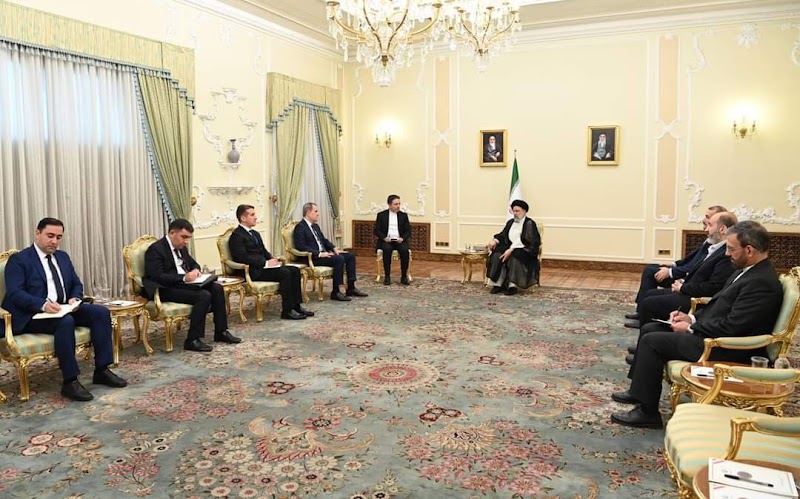Ayaz Niyaz oglu Mutalibov was the first President of Azerbaijan, serving from 1990 to 1992.
Background and History:
- Born: May 12, 1938, in Baku, Azerbaijan Soviet Socialist Republic (SSR)
- Education: Graduated from the Azerbaijan Institute of Oil and Chemistry and later earned a doctorate in economics.
- Career: Worked in various positions in the oil industry before becoming a prominent figure in the Communist Party of Azerbaijan SSR.
Ethnicity:
- Azerbaijani
Achievements and Legacy:
- Elected as the first President of Azerbaijan in 1990 during a period of political upheaval following the collapse of the Soviet Union.
- Declared Azerbaijan’s independence from the Soviet Union on August 30, 1991, and oversaw the country’s transition to a sovereign state.
- Faced significant challenges during his presidency, including ethnic conflicts, economic difficulties, and political instability.
- Forced to resign from office in March 1992 due to pressure from political opponents and ongoing unrest in the country.
Popular Facts:
- Known for his pragmatic approach and efforts to balance the interests of various factions within Azerbaijan during a turbulent period.
- Remembered for his role in declaring Azerbaijan’s independence and shaping the early years of the country’s nationhood.
Mutalibov’s presidency was marked by both achievements and challenges, and his legacy remains a contested one in Azerbaijan’s history.
Emblem of Azerbaijan
To enrich your insights into presidential figures worldwide, also explore some prominent first presidents from other countries, such as Austria, Australia and Armenia. Delving into the leadership journeys of these figures can offer valuable perspectives on their historical significance and pivotal roles in shaping global politics.
The official residence and symbol of the Azerbaijan President
10 Iconic Presidents Who Shaped Azerbaijan’s History

1. Heydar Aliyev: Heydar Aliyev served as the President of Azerbaijan from 1993 until his death in 2003. He was a highly influential figure in the country’s politics and played a key role in its development and stability. Aliyev is widely regarded as the founder of modern Azerbaijan and is credited with bringing stability, economic growth, and international recognition to the country.
- Significance: Founder of modern Azerbaijan, introduced stability and economic growth.
2. Ilham Aliyev: Ilham Aliyev, the son of Heydar Aliyev, succeeded his father as President of Azerbaijan in 2003 and has remained in power ever since. Under his leadership, Azerbaijan has experienced continued economic growth and development. Aliyev has also pursued a policy of diversifying the country’s economy, reducing its dependence on oil and gas exports.
- Significance: Continued economic growth, diversification of the economy.
3. Abulfaz Elchibey: Abulfaz Elchibey was the first democratically elected President of Azerbaijan, serving from 1992 to 1993. He played a significant role in the country’s transition to independence from the Soviet Union. Elchibey advocated for democratic reforms but faced challenges in implementing them due to political and economic instability.
- Significance: First democratically elected President, contributed to Azerbaijan’s independence.
4. Ayaz Mutallibov: Ayaz Mutallibov was the last Soviet-era leader and the first President of Azerbaijan, serving from 1991 to 1992. He played a crucial role in the country’s struggle for independence. However, his presidency was marred by political and economic challenges, including the Nagorno-Karabakh conflict.
- Significance: Last Soviet-era leader, contributed to Azerbaijan’s independence.
5. Artur Rasizade: Artur Rasizade served as the Prime Minister of Azerbaijan for over 16 years, from 1996 to 2018. During his tenure, he played a key role in the country’s economic development and oversaw various reforms. Rasizade is known for his pragmatic approach and his efforts in promoting stability and growth.
- Significance: Longest-serving Prime Minister, contributed to economic development.
6. Isa Gambar: Isa Gambar is a prominent Azerbaijani politician who served as President of the National Council of Azerbaijan from 1992 to 1993. He has been a vocal advocate for democratic reforms and has played an active role in Azerbaijan’s political landscape.
- Significance: Vocal advocate for democratic reforms, influential in Azerbaijan’s politics.
7. Ali Hasanov: Ali Hasanov served as the Chief of Staff of the Azerbaijani President from 1999 to 2019. He played a crucial role in coordinating government activities and advising the President on various matters. Hasanov is known for his pragmatic approach and his efforts in promoting Azerbaijan’s interests.
- Significance: Chief of Staff, influential in government coordination.
8. Mehriban Aliyeva: Mehriban Aliyeva, the wife of President Ilham Aliyev, has played an active role in Azerbaijani politics and society. She is currently the First Vice President of Azerbaijan and has focused on various social and cultural initiatives. Aliyeva is known for her charitable work and efforts in promoting Azerbaijan’s cultural heritage.
- Significance: First Vice President, focused on social and cultural initiatives.
9. Arif Pashayev: Arif Pashayev is a renowned Azerbaijani physicist and mathematician who served as the Minister of Education from 2006 to 2020. During his tenure, he implemented various reforms in the education sector and focused on improving the quality of education in Azerbaijan. Pashayev is known for his commitment to promoting scientific research and innovation.
- Significance: Minister of Education, implemented education reforms.
10. Mehdi Qurbanov: Mehdi Qurbanov is a prominent Azerbaijani diplomat who has held various important positions, including Ambassador to the United States and Minister of Foreign Affairs. He has played a crucial role in representing Azerbaijan’s interests internationally and has been involved in diplomatic efforts to resolve the Nagorno-Karabakh conflict.
- Significance:

